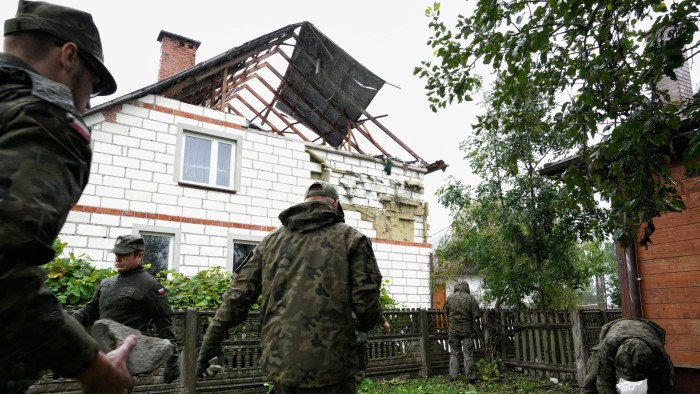Unlock the Editor’s Digest for free
Roula Khalaf, Editor of the FT, selects her favourite stories in this weekly newsletter.
The EU will draw up plans to build and help finance interlinked drone defences across the entire continent’s borders and critical infrastructure, the bloc’s defence commissioner said, after a spate of recent airspace violations by Russia.
EU defence ministers held a hastily arranged meeting on Friday after Russian manned and unmanned aircraft repeatedly crossed into European airspace in recent weeks, prompting calls for the continent to develop a “drone wall”.
“It is very clear that our capabilities to detect drones are not at that level which we need,” European defence commissioner Andrius Kubilius told the Financial Times after the meeting.
Brussels will provide “financial and industrial assistance” to countries after agreeing a “common approach” to the challenge, Kubilius said. Ministers pushed for a multi-layered system including radars, acoustic detection systems and machine guns to down low-tech drones, he said.
While national plans varied, ministers agreed that the approaches should be complimentary, said Kubilius, a former Lithuanian prime minister.
“We want to achieve that our systems would be interoperable. That our detection systems could be able to exchange data, that our control and command systems could be able to exchange information,” he said. “That is very important.”
Drones closed civilian and military airports in Denmark this week, after Nato and the EU had called Russia “reckless” for flying drones and fighter aircraft into the airspace of Poland, Romania and Estonia.
Hours after Nato jets shot down some of the estimated 19 drones that entered Poland’s airspace earlier this month, European Commission president Ursula von der Leyen said the bloc needed to “build a drone wall” on its eastern border. She said this would be “a European capability developed together, deployed together, and sustained together, that can respond in real time”.
Nato officials and Ukraine’s defence minister also joined Friday’s virtual meeting. Ukraine, which has battled Russian drone attacks since Moscow’s 2022 invasion, is expected to provide both expertise and industrial capabilities to the EU initiative.
Some ministers requested financial assistance, said Kubilius, adding that the amounts were “not in the billions”.
While initial discussions around the “drone wall” focused on frontline EU states close to Russia, Kubilius said the project will cover the whole of Europe.
The initiative will require space-based capabilities, he said, to allow close to real-time observation of Europe’s airspace.
“As the European Union, we do not have such capabilities. So that’s why we see a very big need. There are some commercial or national capabilities by different countries, but they are not covering the whole need,” said Kubilius, adding that discussions had begun with the European Space Agency.

